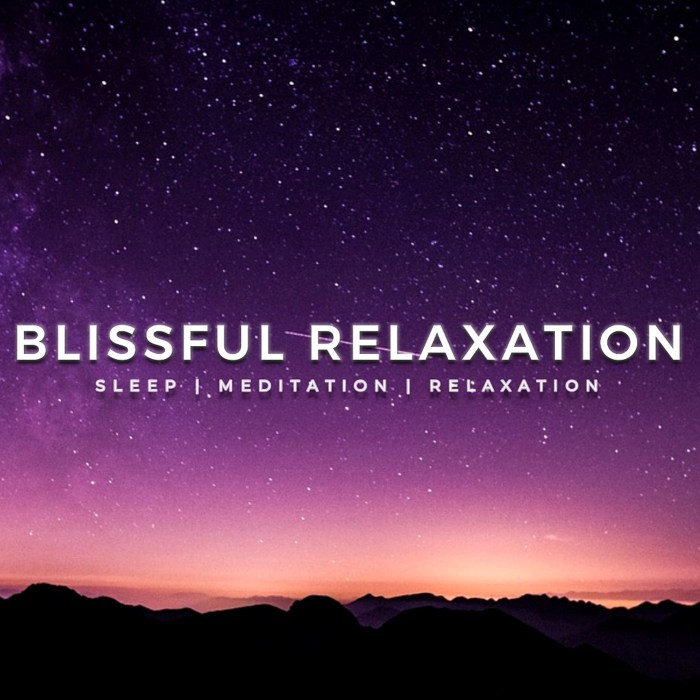Embark on a journey exploring the soothing realm of Meditation music for relaxation, where melodies intertwine with tranquility to elevate your well-being. Discover the profound impact of music on stress reduction, focus enhancement, and sleep improvement.
Delve deeper into the various genres, ambient sounds, and instrumental versus nature music choices that can transform your meditation experience. Learn how to curate the perfect playlist for your relaxation sessions and infuse mindfulness into your daily practice through the harmonious tunes of meditation music.
Benefits of Meditation Music for Relaxation

Source: cloudfront.net
Listening to meditation music can have various benefits for relaxation, including reducing stress and anxiety levels. The soothing melodies and calming sounds can help individuals unwind, relax, and let go of the tension accumulated throughout the day.
Impact on Improving Focus and Concentration
Meditation music can also aid in improving focus and concentration. By creating a peaceful and harmonious environment, it allows individuals to clear their minds and center their thoughts. This can lead to increased productivity and better cognitive performance in various tasks.
Promoting Better Sleep
One of the significant benefits of meditation music is its ability to promote better sleep. Listening to calming tunes before bedtime can help individuals relax their bodies and minds, creating a conducive environment for falling asleep faster and experiencing more restful sleep. The gentle rhythms and melodies can lull listeners into a state of tranquility, facilitating a peaceful night’s rest.
Types of Meditation Music

Source: ggpht.com
When it comes to meditation music, there are various types of genres and sounds that can aid in relaxation and mindfulness. Different genres can evoke different emotions and help you achieve a deeper state of meditation.
Genres of Music Suitable for Meditation
- Ambient Music: Ambient music is a popular choice for meditation due to its calming and soothing nature. It often consists of long, sustained notes and is instrumental in creating a peaceful atmosphere.
- Chanting and Mantra Music: Chanting and mantra music involve repetitive vocal sounds that can help focus the mind and enhance concentration during meditation.
- Instrumental Music: Instrumental music, such as classical or soft piano music, can also be effective in promoting relaxation and reducing stress levels.
- Nature Sounds: Nature sounds like flowing water, chirping birds, or rustling leaves can create a natural and serene environment for meditation.
Characteristics of Ambient Sounds in Meditation Music
Ambient sounds in meditation music often include:
- Soft and gentle tones
- Sustained notes or chords
- Pleasant and calming melodies
- Minimalistic instrumentation
- Ambient sounds like wind chimes, bells, or Tibetan singing bowls
Instrumental Music vs. Nature Sounds for Relaxation
When it comes to relaxation purposes, instrumental music and nature sounds both have their benefits:
- Instrumental Music: Instrumental music can help in reducing stress and anxiety by promoting a sense of calm and tranquility. It can also aid in improving focus and concentration during meditation sessions.
- Nature Sounds: Nature sounds have a grounding effect and can help connect you to the present moment. They create a sense of peace and relaxation by immersing you in the sounds of the natural world.
Creating the Perfect Meditation Playlist

Source: yoga-daily.club
When creating a meditation playlist, it is important to choose tracks that will help you relax and reach a state of mindfulness. The right music can enhance your meditation experience and promote a sense of calmness and tranquility.
Selecting the Right Tracks
When selecting tracks for your meditation playlist, opt for instrumental music or nature sounds to avoid distractions from lyrics. Choose soothing sounds like flutes, bells, or sounds of water to create a peaceful ambiance.
Sequencing for Gradual Relaxation
Start your playlist with slower, softer tracks to ease into your meditation session. As you progress, gradually increase the tempo or intensity of the music to help deepen your state of relaxation. Ending with slower tracks can help you wind down smoothly.
Importance of Tempo and Rhythm
The tempo and rhythm of the music play a crucial role in meditation. Slower tempos and steady rhythms can help slow down your breathing and heart rate, inducing a sense of calmness. Choose music with a gentle rhythm to guide your meditation practice effectively.
Using Meditation Music in Daily Practice

Source: bsomeone.com
Integrating meditation music into your daily relaxation routine can greatly enhance the overall experience and benefits of your practice. Whether you are a beginner or a seasoned meditator, incorporating soothing music can help create a calming atmosphere and deepen your state of relaxation.
Personal Experiences with Music for Meditation and Relaxation
Personally, I have found that playing gentle instrumental music during meditation sessions helps me focus and quiet my mind more effectively. The peaceful melodies and rhythmic patterns guide me into a state of deep relaxation, allowing me to let go of stress and tension.
Role of Meditation Music in Enhancing Mindfulness
Listening to meditation music can serve as a powerful tool in enhancing mindfulness during practice. The soothing sounds can act as a focal point, helping you stay present in the moment and cultivate a sense of awareness. By immersing yourself in the music, you can deepen your connection to the present moment and experience a greater sense of inner peace.
End of Discussion
As we conclude our exploration of Meditation music for relaxation, remember that the power of music lies not only in its melodies but also in its ability to nurture your mind, body, and spirit. Let the rhythm guide you towards inner peace and serenity, one harmonious note at a time.